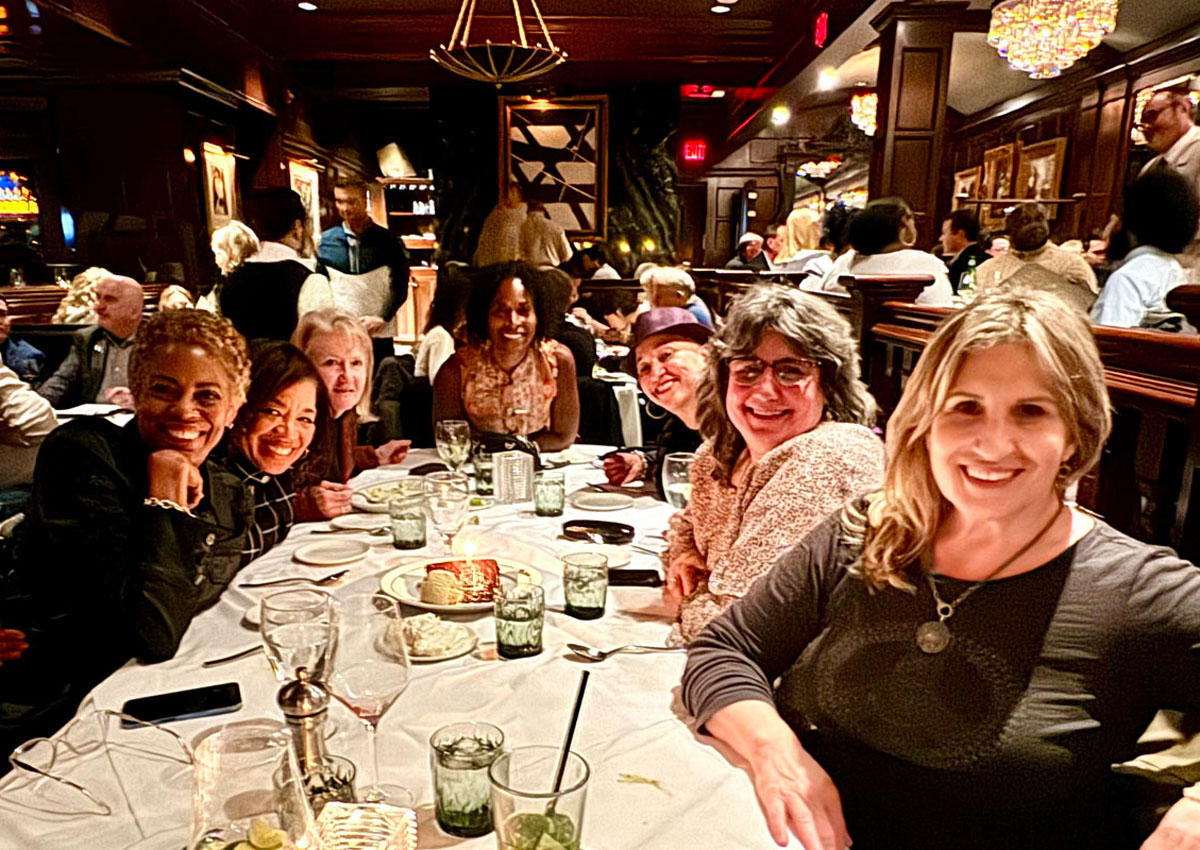April was so gratifying for me. It was a month of witnessing and revisiting the powerful and nurturing connections I’ve cultivated over the years. I was able to join gatherings with colleagues and girlfriends whom I’ve cherished for decades. While at a dinner with these lovely folks, I realized how diverse they are! They are from different religious faiths, races, ethnicities, professions, sexual orientations, social and economic backgrounds, you name it. It dawned on me that fostering and maintaining a “beloved” community has been and remains a cornerstone of my journey through life. I loved that one of you sent a V-mail asking me about my “Why”. Thanks for asking. I think my “Why” is to make the Beloved Community that Dr. Martin Luther King, Jr. often evoked a true reality.
I also experienced the power of community at two separate alumni events. Barnard College held a gala that raised funds to ensure that exceptional young women have access to pursue their education regardless of financial need. I was so inspired by the gala’s two honorees: Helene D. Gayle M.D. M.P.H, President of Spelman College and former president and CEO of Chicago Community Trust, and Francine A. LeFrak, a philanthropist who recently funded the construction of a wellness center for Barnard students.
I was also reminded of the power of community as I joined with other alumnae for Celebration 70+, which commemorated 70+ years of women law students at Harvard. I spoke on a panel entitled “DEI Dichotomy: X Steps Forward, Y Steps Back,” which was deeply affirming and informative. Since women were first admitted to Harvard in 1950, there definitely have been many steps forward with regard to gender equity and safety. Harvard didn’t even have bathrooms when the first class of women arrived! Today we get to celebrate decades of innovative contributions to the legal system and to our society by women.
It is difficult to imagine where our country, the world, or where I would be without the progress driven by those who have committed themselves to work of diversity, equity, and inclusion. A recent report from Littler Mendelson P.C. indicates that many companies are not taking steps back but are continuing to move DEI forward in their workplaces despite the backlash and attacks on DEI.
MLK’s “Beloved Community”
Attending these convenings deepened my conviction that building a Beloved Community is crucial for our growth and development as human beings within and outside our workplaces! At this point, some of you might be asking, “What is the Beloved Community?”
The Beloved Community is an idea that originated from Harvard philosophy professor Josiah Royce and was further developed and made popular by Dr. Martin Luther King. Dr. King’s teachings on nonviolence ring especially true to me in today’s world full of fear, isolation, hatred, and violence. He spoke of the bitterness and traumatization caused by violence on all sides. Now that we are seeing the walls of division rise, we need to continue to reflect on King’s vision. Here are his words describing the spirit of the Beloved Community:
“It is this type of spirit and this type of love that can transform opponents into friends. It is this type of understanding goodwill that will transform the deep gloom of the old age into the exuberant gladness of the new age. This love will bring about miracles in the hearts of men.”
Dr. King went deeper into this concept in some of his other work:
“The aftermath of nonviolence is the creation of the Beloved Community, so that when the battle’s over, a new relationship comes into being between the oppressed and the oppressor …The way of acquiescence leads to moral and spiritual suicide. The way of violence leads to bitterness in the survivors and brutality in the destroyers. But, the way of non-violence leads to redemption and the creation of the Beloved Community.”
Spirit of Community
I recently learned of the term “Communitas” which means “the spirit of community.” Its primary objective is to create a space where all voices are valued equally. Through the concept of communitas, we get to see equity in action. While this kind of community seems far out of reach on a global scale, groups worldwide are working to make it a reality. Communitas America is one such group. It is a NYC-based non-profit organization that uses social entrepreneurship to empower changemakers and build family wealth while reshaping local communities. The organization’s accelerator program, Communitas Ventures, created for historically excluded social entrepreneurs, provides comprehensive business training and creates a community of alumni. Unlock NYC, a tech collective and Communitas America awardee, empowers tenants and creates pathways out of homelessness. The collective’s most significant achievement is the development of an innovative compensation calculator, which ensures each team member’s salary and benefits package reflects essential factors like child care, dependent care, and bonuses for lived experience.
Communitas America’s impact surely cannot be understated. Could the compensation calculator be adapted and scaled within your organization? How can we imagine a world full of Beloved Communities where communitas live at the center of our principles? We are closer to a better world than we may think!
Want more ideas on how to imagine a workplace of demonstrable equity? I recommend starting with resources like the Sustainable Economies Law Center’s “How To Pay Ourselves Equitably,” and the MIT Living Wage Calculator.
Talking Boldly
A crucial tool for fostering the Beloved Community is mastering the art of dialogue across our differences in a manner that cultivates a shared vision and mutual accountability. If you or your team are struggling with communicating or having difficult and honest conversations or simply want to improve unity, connection, and community building, I invite you to check out our Talking Boldly course on TVMCU or pick up my book What if I Say the Wrong Thing. Now is an excellent opportunity to master this valuable skill!
What I’m Reading
I am currently reading Conversational Intelligence: How Great Leaders Build Trust and Get Extraordinary Results by Judith E. Glaser. Glaser identifies three levels of conversation and outlines the obstacles that we confront when communicating with others. She also shares the neuroscience behind our reactions and how we can develop the skills to have more trusting and transformative discussions.
Sunday with Vernā Podcast
A new season of Sundays with Vernā has begun! My first guest was Dr. Jenn Jackson, author of the book Black Women Taught Us: An Intimate History of Black Feminism. I truly learned a great deal from them about Black women who have contributed to the protection, cultivation, and progression of Black communities and our country as a whole. She also offered Black Feminism as a framework for understanding structural inequities and the detrimental impact on marginalized as well as majority groups. As Dr. Jackson mentioned on the podcast, as we continue this work, let’s make it “delicious” by showing how enticing it is to create spaces where all people are valued, heard, and respected.
Listen to the podcast on Apple Music and Spotify here
You can watch it on YouTube
Let’s Socialize!
If you haven’t already, check out my social media accounts, where I frequently share reflections and insights and build community. Get the link to all my accounts HERE, including all the platforms for my podcast Sundays with Vernā.
Let’s chat! Send me your thoughts, reflections, and inspirations at v-mail@vernamyers.com


